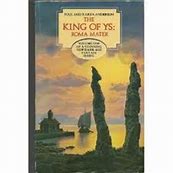Approaching Ys, Gratillonius and his men find two boundary markers, one inscribed in an unknown alphabet, the other, inscribed in Latin, invoking Venus, Jupiter and Neptunus:
"'The old Roman Gods?...Do They still have power...in this place?'"
-Poul and Karen Anderson, The King Of Ys: Roma Mater (London, 1989), VI, 2, p. 100.
Gratillonius explains that the Romans wrongly identified other "Gods" with theirs and that the first inscription would tell about the Gods of Ys. Budic, Christian, denounces the Gods as demons whereas Gratillonius invokes"... Mithras, Lord of Light...," (p. 101) but wonders whether he has wandered too far for the God of his fathers to hear him. Eppilus says of the Ysans:
"'Maybe their Gods are dying too...'" (p. 102)
Polytheism is alive and well in the Andersons' text.
See Wodan-Mercury-Hermes here. The Egyptian god, Thoth, can also be identified with Hermes. I used to think not that the Roman and Greek pantheons had been identified but just that they were a single pantheon with two sets of names.
Aiode: There are few of the old powers willing or able to meddle in mortal affairs in these days, Calliope.
Mneme: Many gods have died, my daughter, while aspects of other gods have been lost forever.
Melete: Hehh. Only the Endless will never die - - and even they are having a difficult time of late.
-Neil Gaiman, "Calliope" IN Gaiman, The Sandman: Dream Country (New York, 1995), pp. 10-34 AT p. 19, panel 6.
Beyond the many is the One: monotheism or monism.

3 comments:
Kaor, Paul!
It's even more complicated than what Gratillonius said about the Roman and Greek pagan gods. Given their common, if by then remote, Indo-European origins, I think these "gods" did have some roots in common.
The Ysan "gods," by contrast, were more Phoenician/Semitic in origin. Except, possibly, Lir?
As a Catholic, I don't believe any pagan "gods" exist as actual beings. There are not many gods, but only the One God.
Ad astra! Sean
The Roman habit of identifying other deities with theirs was perfectly reasonable, as Sean points out, when referring to other Indo-European pantheons.
Eg., Jupiter and Zeus actually -were- the same god -- "Sky Father", just pronounced differently.
Tyr of Asgard was the same deity -- Tiwaz Fader, Deus Pater with the First Germanic Sound-Shift thrown in.
The pantheon of Ys is specifically mentioned to be a Semitic-Celtic syncretism.
Kaor, Mr. Stirling
I thought so, re the Indo/European origins of the Roman, Greek, and Germanic gods. And it made sense for Anderson to imagine Semitic/Celtic origins for the Ysan gods.
Hmmmmm, so consistent Scandinavian/Hellenic neopagans should have no "theological" objection to worshiping each other's "gods."
Ad astra! Sean
Post a Comment